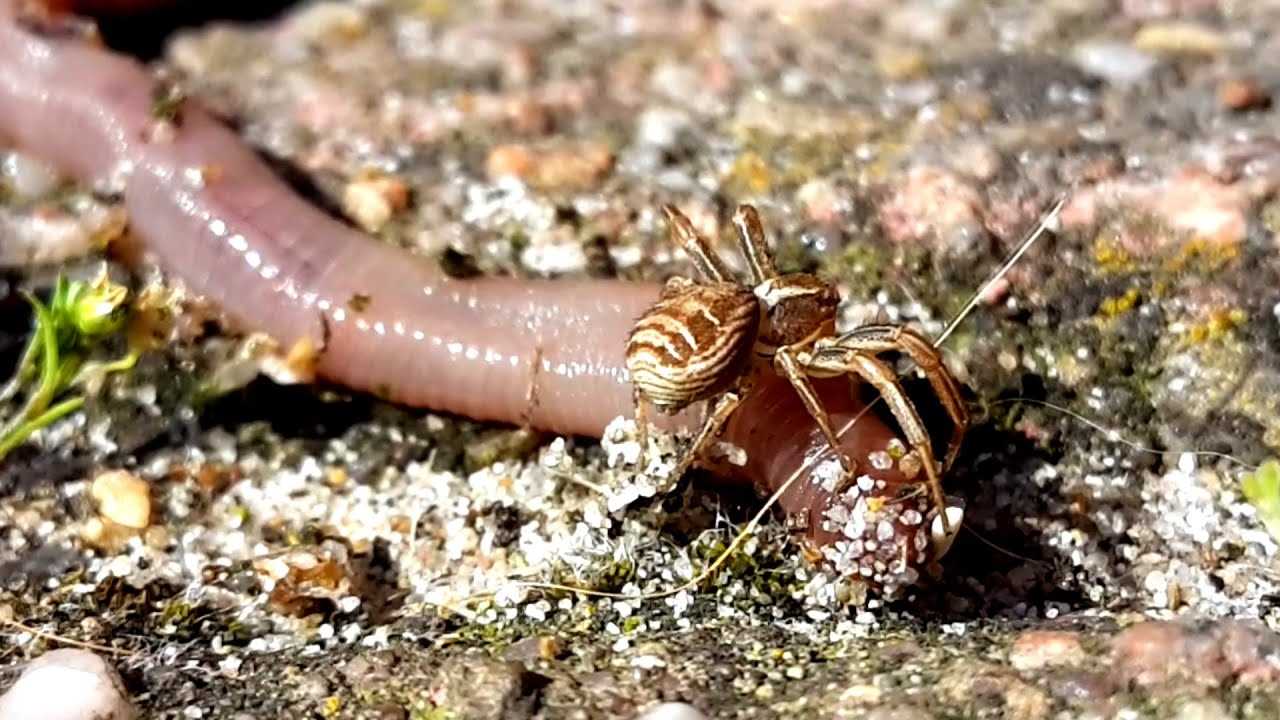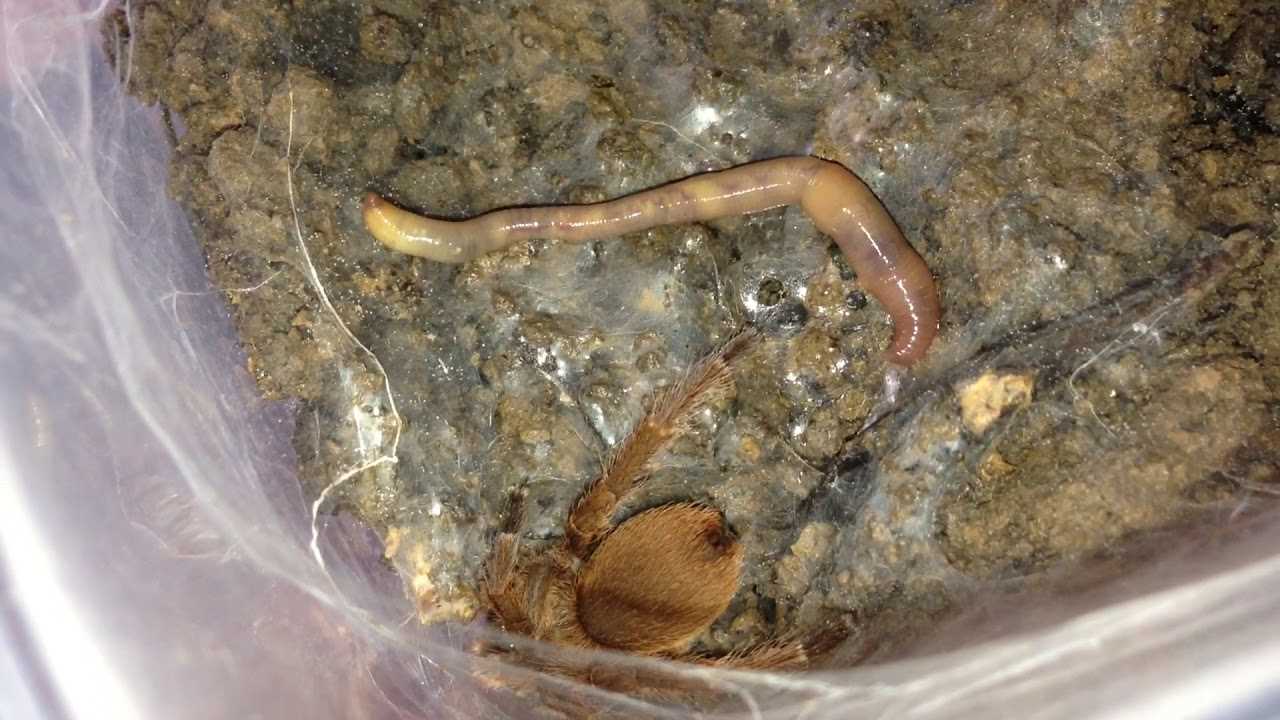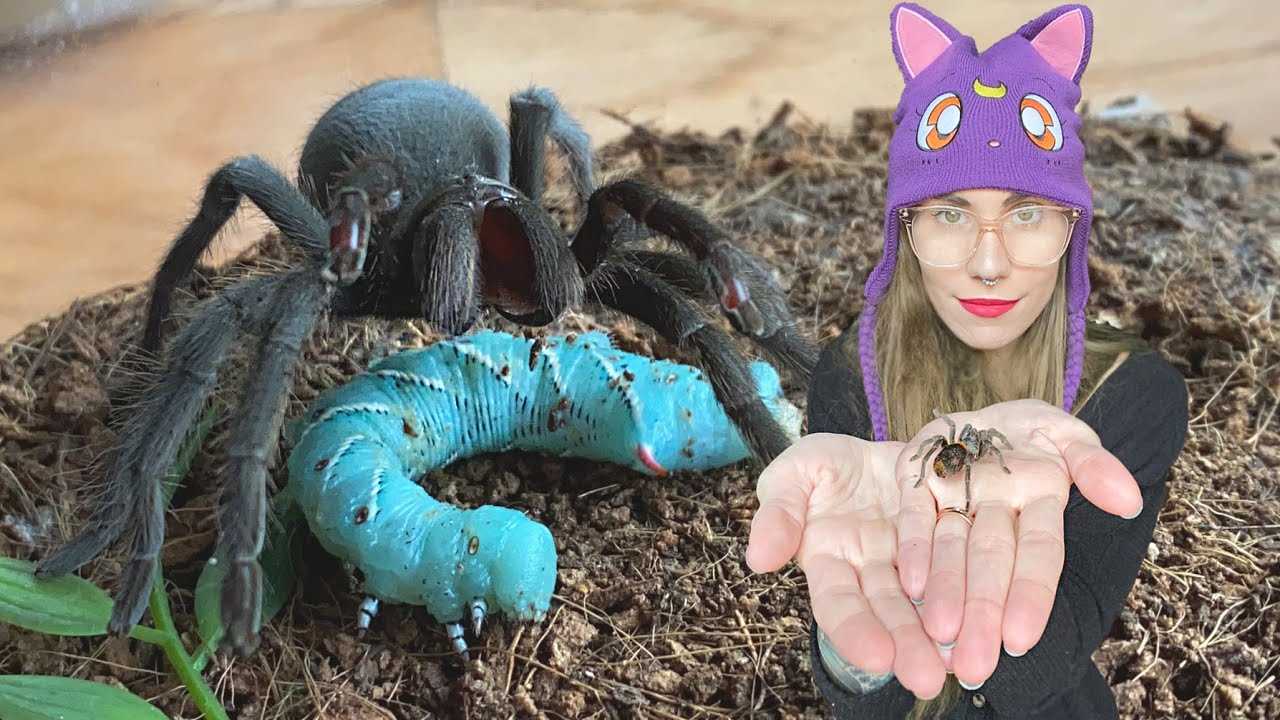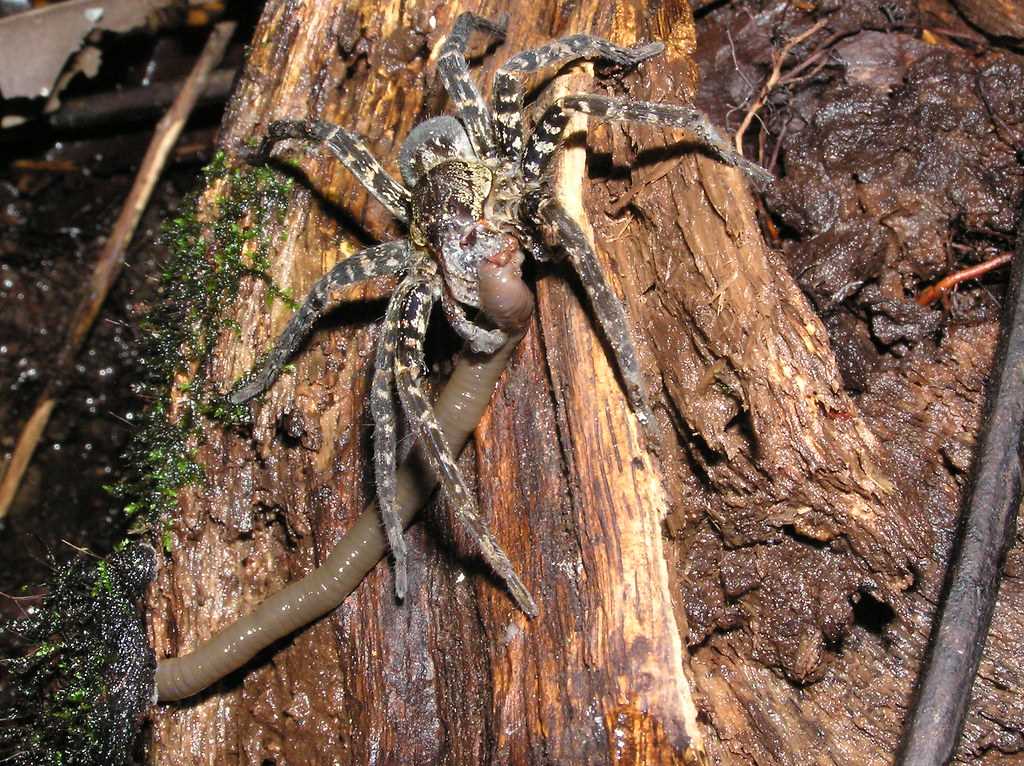
While spiders are primarily carnivorous and their diet mainly consists of insects, they have also been observed consuming worms in certain circumstances. Spiders, like many other predators, are opportunistic feeders and will eat whatever is available to them. This includes worms when they come across them in their web or hunting area.
The Diet of Spiders: What Do They Eat?
Spiders are carnivorous creatures that have a wide range of dietary preferences. They primarily feed on insects, such as flies, mosquitoes, and beetles, but they are also known to eat other arthropods, such as ants and grasshoppers. The diet of a spider is heavily influenced by its size and hunting techniques.
Smaller spiders tend to feed on smaller insects and arthropods that they can easily overpower, while larger spiders are capable of capturing larger prey. Some species of spiders have even been observed preying on small vertebrates, such as lizards and frogs.
Spiders use a variety of hunting methods to catch their prey. Some species build intricate webs to trap flying insects, while others actively hunt by stalking and ambushing their prey. There are also spiders that employ a combination of both hunting techniques.
Once a spider has captured its prey, it injects venom into the victim’s body to immobilize it and begin the process of digestion. The venom helps break down the prey’s tissues, making it easier for the spider to consume.
After the prey has been immobilized, the spider begins to feed by using its fangs to puncture the prey’s body and suck out the internal fluids. This feeding process allows the spider to extract the maximum amount of nutrients from its prey.
The Diet of Spiders: Do Worms Serve as a Potential Source of Food?
Worms, being soft-bodied invertebrates, seem like a viable option for spiders to consume. These elongated creatures can be found in abundance in various environments and are easily accessible to spiders due to their habit of burrowing in soil or residing in leaf litter. But do spiders actually include worms in their diet?
Studies have shown that indeed some spider species do feed on worms. However, the consumption of worms by spiders is not universal, and it varies depending on the spider species and their habitat. Spiders that dwell in damp areas with rich soil are more likely to incorporate worms into their diet.
One reason behind the inclusion of worms in a spider’s diet could be their nutritional value. Worms are an excellent source of protein, which is essential for the growth and development of spiders. Additionally, worms contain other vital nutrients, such as amino acids and minerals, that contribute to a spider’s overall health and vitality.
When a spider captures a worm, its digestive system comes into play. The spider secretes enzymes that break down the proteins and other nutrients present in the worm, allowing for absorption and utilization by the spider’s body.
Contrary to popular belief, spiders do not actively hunt specifically for worms. Their feeding habits are opportunistic, meaning they prey on whatever organisms are readily available and accessible in their surroundings. Therefore, while worms may be part of a spider’s diet, they are not targeted prey.
The Predatory Nature of Spiders
Spiders, known for their ability to spin intricate webs and capture prey, are undoubtedly skilled predators. With their eight legs and venomous fangs, they have evolved to be efficient hunters in their ecosystems. But what exactly do spiders eat, and are worms on the menu?
Spiders prefer to hunt for prey that is active and easily captured. They rely on their keen senses to detect vibrations and movements, enabling them to locate their next meal. Worms, on the other hand, are often found underground or hidden within organic matter, making them less accessible and challenging for spiders to capture.
While spiders may occasionally consume worms if the opportunity presents itself, they are not a preferred or common food source for most spiders. Spiders have evolved to be efficient predators of insects, which provide them with the necessary nutrients for survival.
Overall, it is safe to say that worms are not a significant part of a spider’s diet. Spiders are best known for their ability to capture and consume a wide range of insects, demonstrating their adaptability as predators in various habitats.
Are Spiders Capable of Consuming Worms?
Spiders are well-equipped to capture and consume a range of prey, thanks to their venomous bites and specialized feeding structures. The majority of spiders use their fangs to inject venom into their prey, immobilizing or killing them. Once the prey is subdued, the spider uses its mouthparts to break down the prey’s body and consume the nutrient-rich tissues.
The Digestive System of Spiders

The digestive system of spiders is highly adapted for processing their food. After capturing their prey, the spider secretes digestive enzymes onto their prey, which begins to break down the tissues. The spider then sucks up the liquefied tissues through its mouthparts, into its digestive system, where further digestion and absorption of nutrients occur.
Spiders have a relatively simple digestive system compared to other animals. They lack a true stomach and an intest
The Digestive System of Spiders
Spiders are fascinating creatures with unique biological characteristics. Their digestive system plays a critical role in allowing them to consume a wide variety of prey, including worms.
Spiders have a specialized digestive system that enables them to extract nutrients from the food they consume. When a spider captures a worm, it injects digestive enzymes into its body using its venomous fangs. These enzymes begin the process of breaking down the worm’s tissues, making them easier for the spider to consume.
Once the enzymes have done their work, the spider uses its mouthparts to suck up the liquefied remains of the worm. The digestive system of a spider includes a narrow esophagus, which transports the liquefied food to the midgut. In the midgut, important digestive processes take place, including the absorption of nutrients.
The midgut is lined with specialized cells that release enzymes to further break down the nutrients into smaller molecules. These smaller molecules are then absorbed into the spider’s body through the wall of the midgut, providing the spider with the energy and nutrients it needs to survive.
After the nutrients have been absorbed, the remaining waste material travels through the hindgut and is eventually expelled from the spider’s body as feces. This efficient digestive system allows spiders to extract as much nutrition as possible from their prey, including worms.
The Digestive System of Spiders
Spiders, like other organisms, have a specialized digestive system that allows them to break down and process the food they consume. While their diet primarily consists of insects, spiders are also known to consume other small creatures such as worms.
When a spider catches its prey, it uses its fangs to inject venom into the prey’s body. This venom is not only used to immobilize the prey but also contains enzymes that help to break down the prey’s tissues. Once the prey is immobilized, the spider uses its specialized mouthparts called chelicerae to feed on the liquefied tissues.
Spider’s Digestive Process
After injecting venom, the spider’s digestive system goes to work. The venom not only helps to break down the prey’s tissues but also begins the process of liquefaction. The spider then uses its chelicerae to pierce the prey’s body and suck out the liquefied contents.
Once inside the spider’s body, the liquefied prey is passed into the midgut, which is the primary site of digestion. In the midgut, enzymes continue to break down the prey’s tissues, separating them into smaller molecules that the spider can absorb and utilize for energy.
After the absorption of nutrients, the waste products are eliminated from the spider’s body through its anus. This process allows the spider to efficiently extract the necessary nutrients from its prey while disposing of any waste.
Table: The Spider’s Digestive System

| Component | Function |
|---|---|
| Venom | Injects into prey to immobilize and break down tissues |
| Chelicerae | Pierce prey’s body for feeding |
| Midgut | Site of digestion, breaks down prey’s tissues into smaller molecules |
| Anus | Eliminates waste from the spider’s body |
The Role of Venom in Spider Predation
- Subduing the prey: When a spider catches its prey, it injects venom into the prey’s body. The venom contains toxins that quickly immobilize the prey, making it easier for the spider to handle and consume.
- Digestion: Spider venom also plays a crucial role in the digestion process. The venom contains enzymes that break down the prey’s tissues, essentially pre-digesting them. This allows spiders to consume their prey in a liquid form, making digestion more efficient.
- Defense: Venom can also function as a defensive mechanism for spiders. If threatened or cornered, some species of spiders can inject venom into potential predators or humans, causing pain and sometimes even severe reactions.
Overall, the venom of spiders plays a crucial role in their predatory nature. It allows them to effectively subdue and digest their prey, ensuring their survival and providing them with essential nutrients.
The Impact of Worms in a Spider’s Diet
Spiders eat a wide variety of prey, including insects, other spiders, and even small vertebrates. However, worms are one of the mainstays of a spider’s diet. Worms provide spiders with a valuable source of protein, which is essential for their growth and development.
When spiders consume worms, they are able to extract the nutrients they need from the worms’ bodies. Spiders have a specialized digestive system that allows them to break down their prey and absorb the nutrients. This process involves the release of digestive enzymes that break down the proteins, fats, and carbohydrates in the prey.
The Nutritional Value of Worms
Worms are rich in nutrients that spiders need to thrive. They are an excellent source of protein, which is crucial for building and repairing the spider’s body. Protein is also essential for producing the spider’s silk, which the spider uses to weave its web.
In addition to protein, worms also contain other important nutrients such as vitamins, minerals, and fats. These nutrients are necessary for maintaining the spider’s overall health and vitality.
Worms as a Source of Protein for Spiders
Protein is particularly important for spiders because they have a high metabolic rate. Spiders are active predators and spend a lot of energy hunting and capturing their prey. Protein provides the energy and building blocks necessary for the spider to carry out these activities.
Without an adequate source of protein, spiders may struggle to grow and reproduce. They may also become weaker and more susceptible to diseases and other health issues.
Other Nutrients Found in Worms
In addition to protein, worms also contain other nutrients that are important for a spider’s health. These include vitamins and minerals such as calcium, magnesium, and vitamin D. These nutrients play a role in maintaining the spider’s immune system, skeletal structure, and overall well-being.
Spiders also need a certain amount of fat in their diet to maintain their energy levels. Fat provides a concentrated source of energy and helps spiders to survive during periods of food scarcity.
Spiders’ Feeding Habits: Is There a Preference for Worms?
While worms are an important part of a spider’s diet, spiders are opportunistic predators and will eat whatever prey is available to them. They do not specifically hunt for worms, but will consume them if they come across them.
Spiders are highly adaptable and can adjust their feeding habits depending on the availability of prey in their environment. They have been known to eat a wide variety of insects, including flies, mosquitoes, and even other spiders.
Factors That Influence Spiders’ Food Choice
Several factors can influence a spider’s food choice, including its size, habitat, and prey availability. Larger spiders are capable of taking down larger prey, such as small vertebrates, while smaller spiders may stick to insects and worms.
The habitat in which a spider lives also affects its food choices. Spiders in forested areas may have more access to worms, while spiders in urban areas may rely more on insects that are attracted to human activity.
Finally, prey availability plays a significant role in spiders’ food choices. Spiders will consume whatever prey is abundant in their environment, whether it be worms, insects, or other spiders.
The Nutritional Value of Worms for Spiders

Worms are a potential source of food for spiders, and they offer several nutritional benefits. Spiders require a balanced diet to maintain their health and survival, and worms can contribute significantly to their nutritional needs.
One of the main benefits of worms as a food source is their high protein content. Protein is essential for spiders as it plays a crucial role in building and repairing tissues, promoting growth, and maintaining the proper functioning of the spider’s body. Worms are rich in proteins, making them a valuable resource for spiders to meet their protein requirements.
In addition to protein, worms also contain other vital nutrients that are beneficial for spiders. They are a good source of vitamins and minerals, including calcium, iron, and vitamin A. These nutrients are essential for spiders’ overall health and contribute to their growth and development.
Spiders have evolved to be effective predators, and their feeding habits are influenced by the availability of prey. While spiders do not exclusively hunt for worms, they may incorporate worms into their diet if they come across them. The nutritional value of worms makes them a beneficial food source for spiders, and they can help spiders thrive in their natural habitats.
In summary, worms offer spiders a valuable nutritional resource. Their high protein content, along with other essential nutrients such as vitamins, minerals, and fatty acids, contribute to the overall health and well-being of spiders. While worms may not be the sole prey of spiders, their inclusion in a spider’s diet can provide important nutritional benefits and support their survival in the natural environment.
The Nutritional Value of Worms: Why Spiders Eat Worms
Protein: Worms are rich in protein, which is an essential nutrient for all living organisms. Spiders need protein to build and repair their tissues, produce enzymes, and carry out various physiological processes. Protein also helps spiders grow and develop properly. By consuming worms, spiders can obtain a sufficient amount of protein to fulfill their nutritional needs.
Other Nutrients: Apart from protein, worms also contain other vital nutrients that are beneficial for spiders. For instance, worms are a good source of vitamins and minerals, such as iron, calcium, and vitamin B12. These nutrients play a crucial role in maintaining spiders’ overall health and well-being. By including worms in their diet, spiders can access these essential nutrients that may be lacking in their primary prey sources.
Prey Availability: Another reason why spiders eat worms is the availability of prey. In certain habitats, worms are abundant and serve as a readily available food source for spiders. Spiders are opportunistic predators and will consume any prey they can overpower. Therefore, if worms are prevalent in their environment, spiders are likely to include them in their diet.
Digestibility: Spiders have unique digestive systems that allow them to consume and digest a wide variety of prey items, including worms. They use their fangs to inject venom, which helps immobilize the prey and begin the digestion process. The venom also contains enzymes that break down the internal tissues of the worm, making it easier for the spider to extract the nutrients it needs. The digestive enzymes present in the spider’s gut further aid in breaking down the worm’s body tissues, releasing the nutrients for absorption.
Preference and Adaptation: While spiders may not actively hunt specifically for worms, they will consume them when the opportunity arises. Spiders have evolved to be adaptable predators, capable of adjusting their diet based on the prey available in their environment. If worms are present and suitable for consumption, spiders will readily eat them, benefiting from the nutritional value they provide.
The Nutritional Value of Worms for Spiders
Spiders, being carnivorous predators, have a diverse diet that primarily consists of insects and other small arthropods. However, worms, despite being non-arthropods, can also serve as a potential source of food for spiders. Worms, especially earthworms, possess certain nutritional value that may benefit spiders in various ways.
Other Nutrients: Worms also contain other nutrients that are beneficial for spiders. For example, they are a good source of minerals, such as calcium, magnesium, and phosphorus, which are important for spiders’ exoskeleton formation and maintenance. Worms also provide vitamins, such as vitamin A, vitamin E, and vitamin B complex, which contribute to spiders’ overall wellbeing.
Feeding Habits: While the diet of spiders is diverse, it is not certain whether they have a specific preference for worms. Spiders are opportunistic hunters and often consume whatever prey is available in their habitat. However, it is plausible that spiders may actively search for worms when other food sources are scarce or when they require specific nutrients found in worms.
The Digestive System of Spiders
Spiders possess a unique digestive system that allows them to extract and absorb nutrients from their prey. After capturing their prey with their silk webs or by directly attacking them, spiders inject digestive enzymes into their victims to break down the internal tissues. These enzymes liquefy the prey’s tissues, allowing spiders to suck up the resulting liquid using their specialized mouthparts called chelicerae.
Once the prey’s tissues are ingested, spiders’ digestive system then processes the nutrients. The liquid prey is passed through the spider’s gut, where the nutrients are absorbed into the bloodstream. The waste products are excreted as faecal matter.
The Role of Venom in Spider Predation
Spiders often use their venom to immobilize and kill their prey. The venom injected by spiders contains neurotoxic and proteolytic substances that paralyze and digest the prey, respectively. The proteolytic substances help in breaking down the prey’s tissues, making them easier for spiders to consume.
Overall, worms can provide spiders with a valuable source of nutrients, including protein, minerals, and vitamins. While spiders may not specifically hunt for worms, they may consume them when necessary or when the opportunity arises. The digestive system of spiders is well-suited for processing and absorbing the nutrients from worms, and their venom can aid in breaking down and digesting the prey. Thus, worms can play a significant role in the diet and nutrition of spiders.
Spiders’ Feeding Habits: Is There a Preference for Worms?
Factors That Influence Spiders’ Food Choice
Several factors can influence a spider’s food choice, including the size of the prey, its behavior, and its nutritional value. While worms can be a potential food source for spiders, their lack of mobility and defensive capabilities may make them less desirable compared to other prey items.
Additionally, the availability of different prey options in a spider’s habitat can also influence its food choice. If there are plenty of insects or other small invertebrates present, spiders may be less likely to actively hunt for worms.
The Role of Web-Building Spiders
It is worth noting that not all spiders actively hunt for prey. Web-building spiders, for example, rely on setting up intricate webs to catch insects and other small creatures. These spiders typically do not actively search for worms but may capture them if they inadvertently get caught in their webs.
Furthermore, the digestive systems of spiders are adapted to process different types of prey. Spiders inject digestive enzymes into their prey to break down their tissues before consuming them. The specific enzymes produced by spiders may be better suited for breaking down the tissues of insects rather than worms.
Do Spiders Hunt Specifically for Worms?
While spiders do not actively hunt specifically for worms, they may consume them if given the opportunity. Worms are not a primary part of the spider’s diet, but they can serve as an occasional snack or an alternative food source when other prey is scarce.
However, if a spider encounters a worm within its web or while actively hunting, it is likely to seize the opportunity and consume it. Spiders have a versatile digestive system that allows them to break down a wide range of prey, including worms. They inject their prey with digestive enzymes, which liquefy the internal organs, making it easier for the spider to feed on the resulting fluid.
Factors That Influence Spiders’ Food Choice
One crucial factor is the availability of worms in a spider’s habitat. If worms are abundant and easily accessible, spiders may be more likely to include them in their diet. However, if there is a scarcity of worms or if they are difficult to catch, spiders may opt for alternative food sources.
Another factor that influences spiders’ food choice is their own ability to capture and subdue worms. Spiders have evolved various hunting techniques and adaptations to catch their prey, but not all spiders are capable of capturing worms. Some spiders, like orb-weavers, rely on intricate webs to trap small insects, making worms unsuitable prey. On the other hand, ground-dwelling spiders, such as wolf spiders, may have a better chance of catching worms that come their way.
The taste and nutritional value of worms also play a role in spiders’ food preferences. Spiders have specialized sensory organs that allow them to detect various chemicals, including those found in their potential prey. If worms emit particular chemical cues that spiders find attractive, they may be more inclined to consume them. Additionally, worms are rich in protein, which is essential for spiders’ growth and reproduction. Therefore, if other prey options are lacking in protein content, spiders may actively seek out worms to fulfill their nutritional needs.
Furthermore, environmental factors can influence spiders’ food choices. For example, a study found that spiders in urban environments were more likely to consume earthworms than spiders in rural areas. This could be attributed to the higher abundance of earthworms in urban soils due to human activities such as gardening and landscaping.

I’m Lena Adams—a product of an unconventional upbringing in the African wilderness. My father, a daring explorer of African wildlife, sparked my fascination with reptiles, a passion that intertwined with the tragic loss of my mother during an expedition, leaving an indelible mark on my life. Driven to understand the creatures that captivated my parents, I embarked on my journey, sharing insights about reptiles, frogs, and lizards on my website. Through my explorations and conservation efforts, I honour my family’s legacy while seeking connections—to the creatures, nature, and the mother whose presence I yearn to understand.
